Gaius Julius Caesar was a Roman politician and military general who played a critical role in the events that led to the demise of the Roman Republic and the rise of the Roman Empire. He’s also known as an author of Latin prose. Take a look below for 30 more interesting and awesome facts about Julius Caesar.
1. In 60 BC, Caesar, Crassus and Pompey formed a political alliance that dominated Roman politics for several years.
2. Caesar rose to become one of the most powerful politicians in the Roman Republic through a number of his accomplishments, notably his victories in the Gallic Wars, completed by 51 BC.
3. Cesar became the first Roman general to cross both the Channel and the Rhine, when he built a bridge across the Rhine and crossed the Channel to invade Britain.
4. His wars extended Rome’s territory to the English Channel and the Rhine.
5. After assuming control of government, Caesar began a program of social and governmental reforms, including the creation of the Julian calendar. He gave citizenship to many residents of far regions of the Roman Empire.
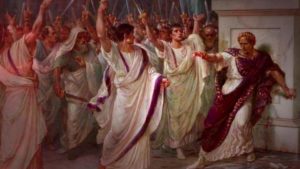
6. He initiated land reform and support for veterans.
7. He centralized the bureaucracy of the Republic and was eventually proclaimed “dictator in perpetuity,” giving him additional authority.
8. His populist and authoritarian reforms angered the elites, who began to conspire against him.
9. On the Ides of March 44 BC, Caesar was assassinated by a group of rebellious senators led by Gaius Cassius Longinus, Marchus Junius Brutus, and Decimus Junius Brutus.
10. Much of Caesar’s life is known from his own accounts of his military campaigns and from other contemporary sources, mainly the letters and speeches of Cicero and the historical writings of Sallust.
11. Caesar’s ancestry could be traced to the first king of Rome.
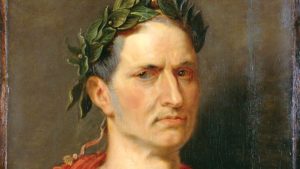
12. When Julius was young, he was kidnapped by pirated on the way to study oratory. They wanted 50 talents ransom. He made friends with the pirates and he was later freed when Caesar’s uncle paid the money. Once he was freed, he had the pirates executed.
13. His face was depicted on Roman coins.
14. Caesar married Cornelia, then Pompeia and finally Calpurnia.
15. It was rumored that Caesar had girlfriends while he was married, including Cleopatra and Servilia Caepionis.
16. Some people believe that Brutus was Julius Caesar’s son because of his relationship with Servilia Caepionis.
17. His involvement with Cleopatra couldn’t result in marriage because he was Roman and she was Egyptian. Roman law would only allow Roman citizens to marry other Roman citizens.
18. Even though Caesar was the Roman dictator, he never had a crown.
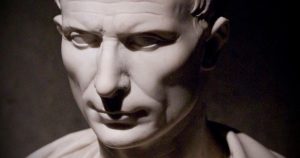
19. Before he became involved in the military, Caesar was planning on becoming a priest.
20. Some believe that Caesar had malaria and possibly tapeworms. It’s also strongly believed that he had epilepsy.
21. There are no living ancestors of Caesar today, even though he married three times and had many girlfriends. All of the children that were born to Caesar’s wives or girlfriends died either as infants or before they could have children of their own. Even Marcus Brutus, the possible son he had with Servilia, died before producing any children.
22. The king of diamonds in a traditional deck of playing cards represents Julius Caesar.
23. When Julius Caesar had Cato the Younger removed from the Senate for going against him, many other senators left as well. When Cesar asked one why he was leaving, the Senator said he’s rather be in jail with Cato than in the Senate with Caesar.
24. Caesar and Cleopatra had a child together named Caesarion, which translates to “little Caesar.”
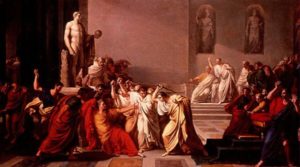
25. In Rome, the ancient temple where Julius Caesar was murdered is now a sanctuary for hundreds of cats.
26. His body was the subject of the earliest known recorded autopsy. Of the 23 stab wounds recorded, only one was potentially fatal on its own. The physician ruled his death due, “mostly to blood loss.”
27. A tribe one surrendered to Caesar, only to launch an attack later on. As punishment for the deceit, he sold the entire surviving population of about 53,000 people into slavery.
28. In a siege against a Gallic city, Caesar built a second wall around the city to keep its occupants from leaving.
29. According to Caesar’s will, if Octavian had died or refused his inheritance, his second listed heir would be Brutus, the man who murdered him.
30. The word “Emperor” in over 30 different languages all stem from Julius Caesar.




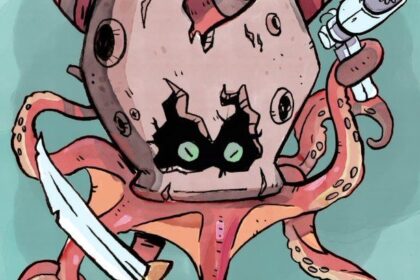
3 Comments
Pingback:
June 1, 2018 at 7:50 pmPingback:
June 20, 2018 at 12:53 pmPingback:
July 3, 2018 at 2:58 pm